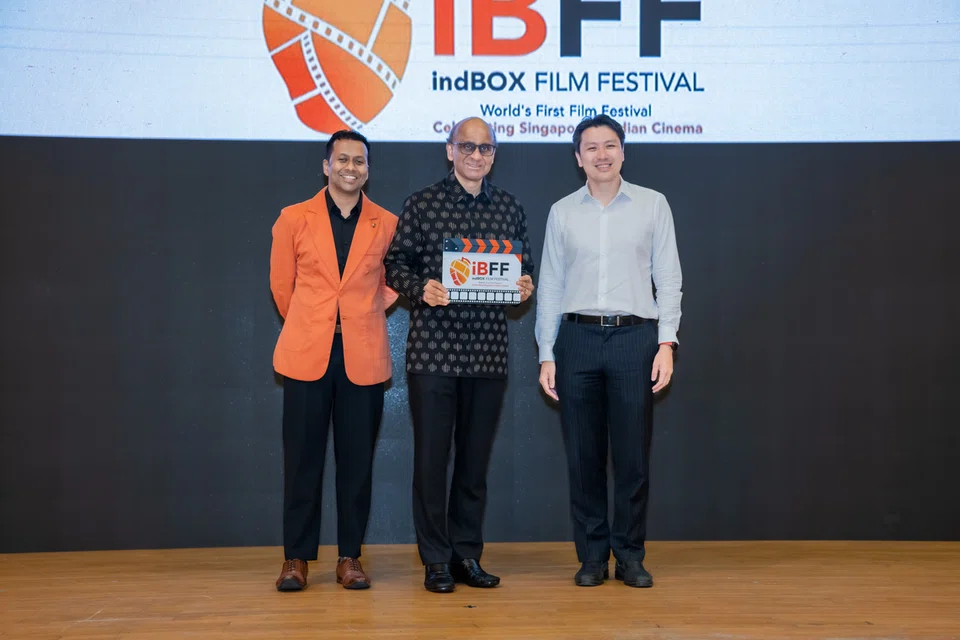With the ceremonial snap of the clapperboard, President Tharman Shamugaratnam officially launched the IndBox Film Festival (iBFF) at the Taman Jurong Community Club on Aug 15.
He was joined by Member of Parliament for West Coast-Jurong West GRC Shawn Huang and Mr Saleem Hadi, iBFF’s festival director and founder of the Singapore Indian Theatre & Film Explorers (SITFE).
Organised by SITFE, the iBFF is dedicated to Singapore’s Indian cinema in honour of Singapore’s 60th birthday. The festival showcased 60 locally produced Indian short films, three of which were screened at the launch.
The three films were The Sari Conversations (2020) by Mr Saleem Hadi, Curry Fish Head (2014) by Mr Srinivas Bhakta and G-23 (2005) by Mr Anthony Chen.
Mr Tharman viewed the first two films – the first, a documentary about saris through the stories of the women who wear them and the second, an animation that explores Singapore’s ever-changing landscape through a girl’s life.
Mr Huang stayed on with the audience to watch the third film, an arthouse-style short film that follows the colourful patrons of an old-school cinema that plays Indian movies.
These films were chosen to showcase three different narratives, said Mr Saleem. One that was simple yet integral to Indian culture, another that employed animation as a form of storytelling, and one by a non-Indian that won the Palme d’Or at the Cannes Film Festival, which, coincidentally, tells an Indian story.
One of the attendees, Ms Vanessa D’Cruz, a writer, particularly enjoyed G-23. “It reminded me of my childhood in the 1980s as I loved to collect the cinema tickets,” she said.
The rest of the festival was held on Aug 16 and 17, with a slate of film screenings, panel discussions, talks and workshops. However, due to poor turnouts, some of these events were cancelled.
An exception was Samuthaaya Veedhi (Social Street), an interactive screening that premiered six short films based on the A Levels’ Tamil literature text of the same name. Moderated by two Tamil teachers, the session, well-received by the students, used the films to better explain challenging parts of Mr Na. Parthasarathy’s novel.
Another event was the STORYMORPH presentation that took place at the National Library Building at Victoria Street on Aug 17. Organised by SITFE with support from the National Arts Council and the National Library Board, STORYMORPH was a screenwriting incubation programme that introduced participants to a wide canon of local Tamil short stories.
Across four sessions held from April to August, they had to adapt one of the stories into a screenplay, which the participants then presented to their family and friends at the iBFF.
“We just said you have to come with a manuscript and left the outcome of the four sessions of the workshop open-ended. Honestly, the participants did so much. They delivered way beyond what was expected,” said Mr Russ Hoe, a film librarian at the Central Arts Library.
Mr Ahas Kalai, 21, produced his own short film, titled Athisayam (Miracle), based on his screenplay inspired by Viral (Finger), a short story written by Madam Kamaladevi Aravindan. Her book, Sembawang: A Novel, was personally chosen by Mr Tharman for inclusion in this year’s inaugural Presidential pop-up library.
“I’m studying cybersecurity, but filmmaking has always been my passion. The first day I came into this programme, I decided I was going to make a film. The whole journey took about three months from pre-production to now,” Mr Ahas said.
The film centres on Paavaadai, a migrant worker who injures his finger in a workplace accident. Shan, 19, the actor who played Paavaadai, said: “We need more platforms for people to showcase their talent, and this is a really good initiative by SITFE. I hope there’s more to come in the future.”
The iBFF concluded with a tribute screening of Mr K. Rajagopal’s six short films. It included I Can’t Sleep Tonight (1995), The Glare (1996) and Absence (1997), which won the Singapore International Film Festival’s Special Jury Prize for three consecutive years.
“Most of them are personal stories, but not all. Some were adaptations from Tamil literature, but my early films were for my parents. My mother was my good luck charm. Every time she appeared in my film, I won an award,” said Mr Rajagopal at the screening.
There was no better way to close the festival than with the works of a prolific feature filmmaker, such as Mr Rajagopal, who began his three-decade career with raw and compelling short films that went on to inspire many in the iBFF collection, Mr Saleem noted.


